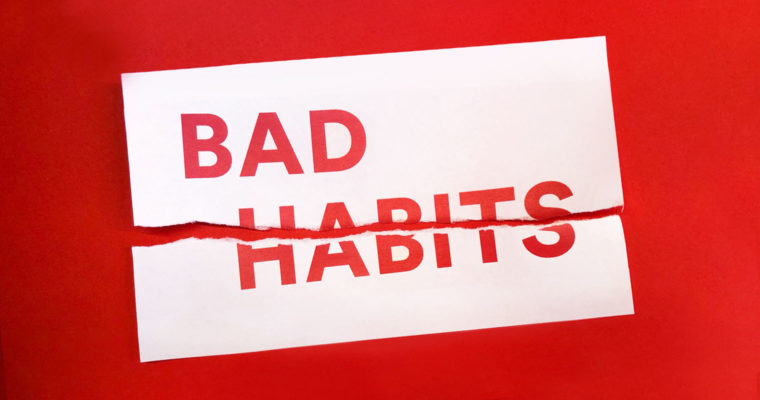
Writing well is hard work. But getting rid of a few bad habits can make it easier—and help your prose shine.
If you want to improve, it won’t happen by accident. Luckily, science can help. Here’s how to break bad habits in your writing.
Give yourself a fresh start.
You’re within your rights to consider New Year’s resolutions cheesy, but science suggests they help.
Researchers at the Wharton School found that such milestones “relegate past imperfections to a previous period, induce people to take a big-picture view of their lives, and thus motivate aspirational behaviors.”
Breaking bad habits means putting them in the past—so why not make an occasion of it?
Don’t just end your bad habits—start better ones.
Rewiring your behavior can be tough no matter what. If you’re already shaking up the patterns that lead to unwanted tendencies, it’s a good opportunity to build good habits in their place.
It’s much easier to start doing something new than to stop doing something habitual without a replacement behavior. – Elliot Berkman, Ph.D.
As an example, let’s say I have a nasty tendency while writing articles to dive back into my research in pursuit of a key number or fact. This habit leads to time-sucking detours that I can’t always afford when my draft is due.
I could stubbornly tell myself I’m not going to be distracted. In a colossal display of restraint, I might even succeed. But researchers like Elliot Berkman, a psychology professor at the University of Oregon, say I might enjoy better results if I devise an alternative to this behavior, rather than try to quit it outright.
In my case, I’m realizing it’s sometimes better to put TK in place of a statistic or quote that I know exists but don’t have at my fingertips. (In journalism and publishing, TK is old-timey shorthand for “to come.” It lets my editor know there’s a detail I plan to revisit.)
To decide what you’ll do in place of a bad habit, you have to answer a key question:
What is it you want to do instead?
Knowing what you want to accomplish in broad terms can help you break bad habits on two levels.
1 Be flexible.
First, it’s better to have a defined goal that you can work toward in different ways, rather than handcuff yourself to a specific means of achieving it. That way, if one approach fails, you’re free to change tactics.
Say your goal is to write leaner, more direct prose. You might try reading your drafts out loud; anytime you find yourself gasping for breath, you know to pare down a sentence or break it up into smaller parts. If that doesn’t work, a simple game might suffice: any time a sentence is longer than two lines on your screen, look for a way to shrink it. (This one might be addictive. Having done it for years, I’ve come to feel a slight dopamine rush every time I succeed at it.)
Crucially, your stated goal was never “read every draft out loud.” That was one technique you were willing to experiment with—and possibly abandon.
2 Have a long-term vision.
Broadly conceptualizing your goal (or resolution, if you prefer) also helps because it’s more attainable if you have a clear picture of what success looks like in your mind. Sticking with new routines can be hard—so that extra motivation matters. Seeing yourself a year from now, hammering out tighter drafts that are free of hedges and cliches, might just make the difference.
Be patient—worthwhile habits take time.
You likely know the old saying that a new habit takes 21 days to form. But research published in the European Journal of Social Psychology puts the average closer to 66 days and ranges up to 254—almost nine months.
And there will surely be stumbles along the way. Even the most prolific authors will still sometimes struggle with procrastination, and even the most poetic will occasionally succumb to a rambling first draft packed with dull imagery. Charles Duhigg, who wrote The Power of Habit, says you should expect to sometimes backslide into your old habits—and plan accordingly.
“The question isn’t ‘Are you going to be able to avoid that?’” he says. “The question is ‘What are you going to do next?’”
Grammarly can help.
Grammarly not only keeps your spelling and punctuation looking sharp; it can also help you tackle other challenges listed above, like trimming away unneeded turns of phrase.
If you’re trying to make a habit of better, easier writing, make Grammarly part of your routine.
![]()






